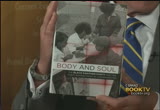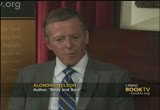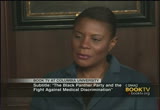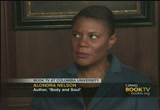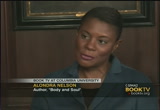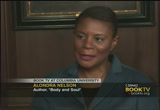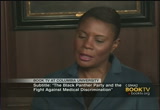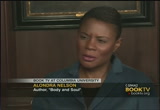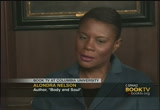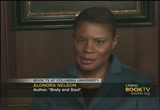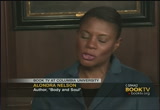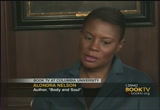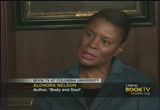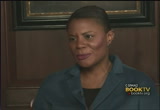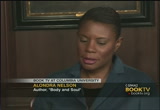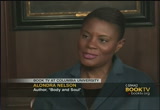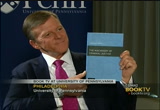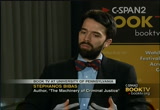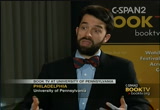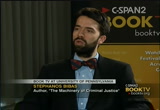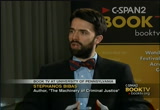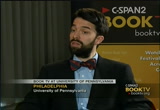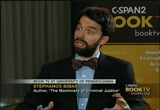tv Book TV CSPAN February 10, 2013 1:35pm-2:00pm EST
1:35 pm
>> host: columbia diversity professor, alondra nelson, author of "body and soul," what is the black panther party founded originally? >> guest: the black and their party was founded originally because of dissatisfaction with economic justice issues in the united states in 1966. so what's interesting about the black panther party and there found in is that it is founded right after some of the greatest success of the civil rights movement. so the legislation brings the voting rights act civil rights act. so i think with 40 years of vision, we can see part of it the panthers were doing for responding to that was left undone by the advancements. >> host: what was left undone? >> guest: people were still hungry. people still back at the understood as human rights. food, clothing and health care.
1:36 pm
basic fundamental things people like in american society, particularly poor african-americans. >> host: were the founders? >> guest: the founders were bobby seale and huey who are interesting because they are migrants from the south. the black panther story is a great migration story, so they come from texas and louisiana to the bay area to oakland and they find themselves in the center of history a couple decades later. >> host: your book focuses on medical care. you write that the black panther party, the panthers were heirs to an unchartered tradition of african-american health politics. >> guest: it means we haven't looked closely enough at the fact that the civil rights tradition, even if we think about the 20th century, because it was always a medical act to this tradition, so i
1:37 pm
think we understand the forms of discrimination, jim crow racial segregation that we understand this is part of the early 20th century african-american life also included health care. if you go back across the 20th century to the organizations in the initiative we think is important, health care is always there. one way of thinking about the black panther party is to put them in this genealogy of people like marcus garvey who had a cadre of nurses. people like nonviolent coordinating committee come which people know how, but also had an arm that tenet to activists who are during the civil rights movement and essentially local communities. we need to understand the black panthers turned to health care both this and think strategic and internal to what they were dealing with in the late 1960s and early 1970s, but also a larger tradition and responding
1:38 pm
to medical discrimination. >> host: what transpired with the black interparty medical care clinics >> guest: lots of interesting things. by the late 1960s the national network of health clinics was mandated in the party in 1970 that every chapter of the party but panther chapter. a 68, 69 they were springing up because panthers had captured the attention of a whole generation of young people. if you're going to start a chapter, you have to have a care clinic and they also attend these clinics was often basic definitive care. often referrals to care for people who have more serious issues. and they also did things like genetic screening. genetic counseling and screening for sickle cell anemia while before was a national issue were talking about sickle cell anemia as we are today. they were also involved in early
1:39 pm
attempts to challenge sociobiology. early 70s mottos leaking to issue such violent than other kinds of behavioral problems. >> host: where did they get the funding? >> guest: the funding came from all sorts of places. they were very strategic in the way they cut the funding. for example in north carolina they ran ambulance service and part of the funding came from the diocese of north carolina. they also solicited donations from medical supply companies. there were donations from some of the doctors i interviewed who worked the black panther party would get donations from the hospital said the medical areas where they were resident in the lake. they just really pulled it together. these are very much shoestring operation that were dependent on local collaborations, including other health care activists and
1:40 pm
young radicals, doctors, nurses, technicians who shared the black panther party's perspective and desire for social change. >> host: with adapters on these clinics? >> guest: one was a gentleman named terry cooper who is a psychiatrist who helped to establish the free people medical clinic in central los angeles and was founded in december 1969. he was at the time -- i think he was to psychiatry resident at ucla. so he would have to pay up her sister at that clinic. he would go on to be involved with other panther activities of the course of his career. there is a position and told her small, who was then his personal physician. he was a personal physician to angela davis. he also sought george jackson
1:41 pm
commissaries never joined the party. this is at a time in oakland and listen in turn and oakland highland hospital. he helped the party to strategize about sickle cell anemia program organized and the southwest he helped the party around chapters, educating the rank-and-file members. >> host: why are you writing about this now? is the health care debate we just had in this country? >> guest: i jot those connections in the boat. part of what's interesting is 45 years after the black panther party was founded, we still have fundamental issues talking about the issues that have come back and public discourse with regard to the affordable care act. we should pay for her, should everyone have a baseline level of help cared this are precisely
1:42 pm
the issues to 45 years ago panthers were talking about. they seem far more radical. obviously still right now, but it's interesting that the third circuit shifted into mainstream discourse in a particular sort of way. i think also i'm writing about this now because i was initially interested in writing about the hava epidemic and the difficult sears surplus by communities face in combating the epidemic and the 1980s when it emerged given the history and trajectory of civil rights struggle and the civil rights movement. part of what they history tells us is by communities have been effective in organizing and mobilizing very sorts of issues, particularly in the late 20th century. so i wondered, where did all that energy, those institutions and networks go by the time i got to the 1980s? that's right began. like many historical or
1:43 pm
sociological projects come you find yourself going back and i ended up at the black panther party and sickle cell anemia and the other chapters from there. >> host: was the legacy of free clinics? and they still exist? >> guest: they don't exist as panther clinics, but to legacy is worth noting. some researchers at the university of washington in special collections because they were successful chapter for many gears. part of my research was also interviews. but i also like drama neighborhoods to get a sense of where the clinic was located vis-à-vis headquarters. just to get a sense of what it felt like. i discovered the family medical center, which is now an ngo. it's a nonprofit medical center
1:44 pm
in seattle that's named for a former member of the black panther party. and so, one of the questions i get asked about was why didn't we know anything about the black panthers activism? when of the curious things to fear the clinic named for former black panther. walk into the clinic and there's a photograph of her, a plaque that says this clinic is working in the tradition of the black panther party that very much sort of valorize his and recognizes the contributions of the black panther party in the fight against medical discrimination in the struggle to expand health care access. that clinic still exist today. it serves all sorts of people in the city of seattle. another thing to see, and marketers who think goofiest permission of the the common krumholtz collective, which exists now is an ngo in louisiana. 2005 after hurricane katrina in
1:45 pm
august 2005 izzo recalled there was the health care infrastructure collapsed in new orleans. many people were left in places like charity hospital today. a lot of first responders for that to be the city and often their catastrophic situations. so you have not only the health care infrastructure more particularly. within a few days of hurricane katrina, three activists start the common ground collective and very basic preliminary health care services for people who remained in the city. one of these people is malika verheyen, a member of the black panther party in new orleans. they talk about starting the common ground clinic with these two other people, a doctor at another act of this, he says very freely the reason he felt like he could do this in the
1:46 pm
face about this catastrophe all around them is they have done similar work in the black after party. these two clinics operate today as distinct legacies of activism. >> host: alondra nelson, is they are a distress towards health care, and i hate to say health care, but i'm thinking specifically of the tuskegee experiment. >> guest: sure, absolutely. it's an important question because the 40th anniversary tuskegee assist july. so yes, there is a distress. we see distress in music counts in these sorts of things and sociological literature goes way back. well across the 20th century. the black panther party was responding to that two issues have distress. they wanted to have doctors who are approachable, who are
1:47 pm
accountable to their patients, who would agree to communicate in certain ways to treat them with respect and appropriate care. it's a part the black after party was doing was doing with the sheer distress by changing dynamics of patient a her interactions. making patients feel empowered as opposed to always feeling subjugated by the encounter. one of the interesting things about the black panther party with tuskegee is work begins before tuskegee is revealed in 1972. thinking about this anniversary, one of the things they might think about the black panther party is they set the stage in terms of the debate around issues of race and health, issues of health fitness test and what can be done with them. it was that conversation that the tuskegee regulation and terry. the black panther party had
1:48 pm
three for years before tuskegee westerville talking publicly about health care issues and issues of race health and stress. >> host: you a ton of the 45th anniversary of the black panther party. but it's not like? >> guest: i did. anniversaries are interesting because people come from all over the country. people who maybe 15 or 20 years ago would not be speaking to each other because they had different ideas about the party works at a bend. sometimes all over the world they tell their stories. they tell what was useful for the boat, what they call chapter history. the remaining members of the chapters that can't talk about work they didn't create a collective account and memories if you do in a historical work very piecemeal. was interesting about the chapter history as one person was saying remember this in the other person to fill in for corrected with these sorts of things. there's also lots of young people. there were scholars like myself, also young people interested and
1:49 pm
were activists who are interested in legacy of the parties. so it's a very eclectic dynamic, interesting setting. postcodes do we need and bobby seale is still alive? >> guest: kiwi is deceased. he was killed in the 1980s. bobby seale is it best today, still speaking about the black panthers were on a regular basis. >> host: and why did the body disband? >> guest: several reasons. one was the fbi's counterintelligence programs, which was quite successful in doing a few things. installing provocateurs within the party that created some discord that exists now in the party between different factions. they were successful in the call until program and just police repression. the people were dying. part of what i write about is the health programs -- there's a
1:50 pm
way in which health programs respond to the fact that members of the party were dying in armed conflicts with the police come to state authorities federal authorities. so decimated demand for the party in a fatal and material way was partly why the party disbanded. i think politics change. so the party hands in the early 1980s in the world change between 1960 and 1980 and is easier on the social movement often to be an activist when you're younger, when you're 18 or 20 don't have a mortgage, children, the light stakes could be a lot lower for being an activist and mistakes have been an activist are quite high. heart of his age and a natural cycle of organization as well. >> host: on the 50th anniversary of the black panther party, is there another book from you in the party? >> guest: there's not another book, but i continue to write about african american
1:51 pm
engagement with issues of health and science. >> host: alondra nelson teaches sociology at columbia university. this is her book, "body and soul: the black panther party and fight against medical discrimination." published by the university of minnesota. >> host: now joining us is author and professor, stephanos bibas, whose new book, "the machinery of criminal justice" is published by oxford university press. professor bibas, do we have an efficient criminal justice system? >> guest: we've got a system that is moved from what people expect it to be. a public morality play where we blame in punish and heal victims
1:52 pm
to when taken over by the lawyers. we have professionals who have maximize the speed of the system. its hurried plea-bargaining that disposes of 19 out of 23 cases. it's efficient, cheap, the bargain for justice. said that it didn't have no say, often don't know what happens in the cases. defendants feel like they copped a plea or got away with something. the public wonders, why is this a deal rather than every name verdict should become very busy in the last two centuries for before the nation was founded, criminal justice was about right and wrong, pain and blame and apologies and healing. we have too many criminal cases, so the lawyer says that being said by pleading cases out one after another as a cookie-cutter or an assembly line system. so lawyers committee insiders who run the criminal justice
1:53 pm
system thinks it makes sense. his sheep, joseph saccharin caseloads. they don't understand why nonlawyers are frustrated. it seems that justice has been often sold. it seems that people got away with something. the results as voters continue to clamor for higher sentences and tougher laws. lawyers undercutting provisions by cutting them away the special deals and other people are stubborn enough to go to trial wind up getting heavier punishments. the voters react because it seems like it's hidden in this low visibility and some is on connections or layer rather than did. the frustrating thing here of course is to have a democracy. the system should be run for what the people think it's about, which is blaming and punishing, but instead we have a system where people don't understand what's going on. we can't go back to an era where every case was tried to a jury.
1:54 pm
our system is too clogged, too expensive. trout takes far too long today over the past half-century to make them too complicated. for what we can do is try to simplify, try to include port or a people. but the ends have a say at the trial. but the defendant speak rather than everything go through layers. off from our courage made and opportunities for remorse and apology in restitution because victims and defendants had to go back to living with each other. friends, relatives try to figure out a way to fix a broken punishment system, which right now is a warehouse for criminals in prisons to network with other people for when they come out again instead find ways to get them involved in work, to gain skills, and maybe even served the military and once they've done their time and pay tax when they can come back out to a law-abiding job instead of being exiled to go right back to drug
1:55 pm
dealing. >> host: paul professor, did we ever have a criminal justice system where we did focus on punishment and then reintegration in these good things as you see them? >> guest: yes. in the 17th and 18th centuries of colonial american, it wasn't just the upper middle class people punishing the poor as a permanent underclass. people of all races and economic backgrounds, and better committed wrongs, got punished temporarily in the town square. everyone saw them get what they deserve and after the temporary punishment they came back, many respectable citizens went on to publish high offices. what happened was present was meant to be a humane reform were people in penitentiaries could repent didn't turn out that they learned anything and they just networked with other criminal
1:56 pm
convicts and came back out. we have to move towards making prison something other than a warehouse in criminal process about something other than plea bargain deals, but about declaring what's right and wrong in finding a way people can do something to say they pay their debt to society can't pay their debt to the den. and then come back into society. >> host: you currently teach law at the university of pennsylvania and criminology as well and director of the university supreme court clinic. what's your practical experience? guest cohost a federal prosecutor in new york city and i thought every kind of case. i thought people who are sorry for what they done and wanted a chance to make amends and the system did do anything to encourage it. i saw people angry and in denial and the system didn't confront them or make them dress up to they've done. i saw a good welding
1:57 pm
professionals who take it for granted the system had to be an amoral assembly-line. i think the jurors and voters and victims and defendants are frustrated the lawyers just don't seem to listen. >> host: how often the push for a plea bargain or how often we approached we plea-bargaining? >> guest: and every case there were three jury trials in one trial, which was pretty typical. we can't do away with that system. what we can do is sentence opportunities for people to talk and focus punishments on something more project is like working in making restitution and apologizing. >> host: did you suggest that as a federal prosecutor? >> guest: i did. the people most willing to fess up and make amends sometimes found up with a misdemeanor charge instead of the felony charge. the ones who seem stubborn or in denial or were sorry only they'd gotten copper more likely to face the full weight of the law.
1:58 pm
but i think there's more that could be done to encourage the acceptance of responsibility. >> host: professor bibas, one of the sidelines as being soft on crime. not good for politicians. >> host: this is a unique opportunity to reassess criminal justice. states are spending 10, 15, 20% of budgets online force and then they recognize they can't keep locking people out. oregon and washington visit what do we do? to legalize it? to be decriminalized that? when the victims are heard, but the insert command to for longer sentences. people recognize 25 years in prison for his stealing a slice of pizza is too much and it's unaffordable and their society people were scared about. we need to lock them up until they are no longer dangerous because once they pass the young male post of yours. but there's a lot of people were
1:59 pm
nonviolent drug offender or seen opportunity to take some punishment, but make some amends. the thieves, shoplifters, the nonviolent burglars, a lot of them matter he said on a life of crime amanita chant to give them an opportunity to reclaim themselves. >> host: it in your view to the three strikes and you're outlaws, do they work? >> guest: the book talks about the way in which prosecutors manipulate them. voters think they will automatically lock out the dangerous felons, but they would be broader than people who have any violence in a record for the latest kind as they would have to be a violent one. prosecutors routinely bargain them down, manipulate them into people get hit or not the most dangerous criminal defendants. they are the ones who put a trial to reject a plea bargain offered. >> host: just a taste
231 Views
IN COLLECTIONS
CSPAN2 Television Archive
Television Archive  Television Archive News Search Service
Television Archive News Search Service 
Uploaded by TV Archive on

 Live Music Archive
Live Music Archive Librivox Free Audio
Librivox Free Audio Metropolitan Museum
Metropolitan Museum Cleveland Museum of Art
Cleveland Museum of Art Internet Arcade
Internet Arcade Console Living Room
Console Living Room Books to Borrow
Books to Borrow Open Library
Open Library TV News
TV News Understanding 9/11
Understanding 9/11